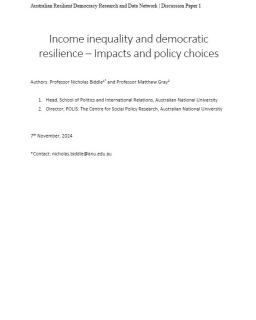
Abstract
This paper examines the relationship between income inequality and democratic resilience in Australia, focusing on how perceptions of economic disparity influence public satisfaction with democratic institutions. Utilising data from the Asian Barometer Survey and ANUpoll series, the study reveals a significant association between the perception of unfair income distribution and dissatisfaction with democracy. While income inequality in Australia has not markedly increased, the research highlights that public concern over income gaps persists, influencing attitudes towards the government's role in addressing these disparities. The analysis also demonstrates that demographic factors, such as age, education, and income, are important predictors of democratic satisfaction, but perceptions of income inequality and beliefs about the government's responsibility in reducing these gaps play a crucial role.
File attachments
| Attachment | Size |
|---|---|
| Resilient-Democracy---Discussion-Paper-2024.pdf(508.71 KB) | 508.71 KB |